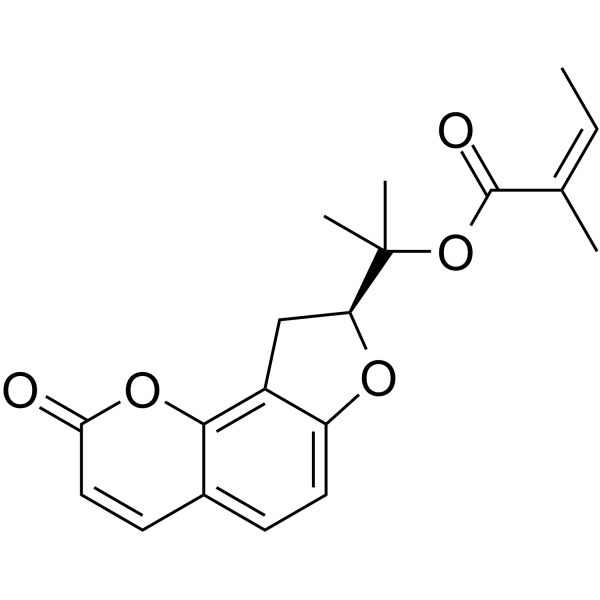天然产物 天然产物苯丙素类 Phenylpropanoids
Columbianadin (Synonyms: 二氢欧山芹醇当归酸酯) 纯度: 99.03%
Columbianadin 是来自 Angelica decursiva (Umbelliferae) 中的天然香豆素,已知具有各种生物活性,包括抗炎和抗癌作用。

Columbianadin Chemical Structure
CAS No. : 5058-13-9
| 规格 | 价格 | 是否有货 | 数量 |
|---|---|---|---|
| 10 mM * 1 mL in DMSO | ¥660 | In-stock | |
| 5 mg | ¥600 | In-stock | |
| 10 mg | ¥900 | In-stock | |
| 25 mg | ¥1900 | In-stock | |
| 50 mg | ¥3200 | In-stock | |
| 100 mg | 询价 | ||
| 200 mg | 询价 |
* Please select Quantity before adding items.
Columbianadin 相关产品
•相关化合物库:
- Natural Product Library Plus
- Bioactive Compound Library Plus
- Apoptosis Compound Library
- Immunology/Inflammation Compound Library
- Natural Product Library
- Anti-Cancer Compound Library
- Traditional Chinese Medicine Monomer Library
- Food-Sourced Compound Library
| 生物活性 |
Columbianadin, a natural coumarin from, is known to have various biological activities including anti-inflammatory and anti-cancer effects. |
IC50 & Target |
Apoptosis[1] |
||||||||||||||
|---|---|---|---|---|---|---|---|---|---|---|---|---|---|---|---|---|---|
| 体外研究 (In Vitro) |
Columbianadin (CBN) effectively suppresses the growth of colon cancer cells. Low concentration (up to 25 μM) of Columbianadin induces apoptosis, and high concentration (50 μM) of Columbianadin induces necroptosis. The induction of apoptosis by Columbianadin is correlated with the modulation of caspase-9, caspase-3, Bax, Bcl-2, Bim and Bid, and the induction of necroptosis is related with RIP-3, and caspase-8. In addition, Columbianadin induces the accumulation of ROS and imbalance in the intracellular antioxidant enzymes such as SOD-1, SOD-2, catalase and GPx-1. Columbianadin shows the most effective growth inhibitory activity against human colorectal cancer cells. Accordingly, further study is performed using HCT116 cells to give the detailed growth-inhibitory mechanism of action mediated by Columbianadin. The cells treated with various concentrations of Columbianadin (0-100 μM) exhibit a dose- and time-dependent growth inhibition with an IC50 value of 47.2 and 32.4 μM after 48 and 72 h incubation, respectively. Treatment of various concentrations (12.5, 25, and 50 μM) of Columbianadin for 48 h in HCT116 cells decreases the number of cells and increases the floating cells. Apparent morphological changes with round-shape and dying cells are also observed at 25 and 50 μM Columbianadin -treated cells[1]. MCE has not independently confirmed the accuracy of these methods. They are for reference only. |
||||||||||||||||
| 体内研究 (In Vivo) |
The analysis method is successfully applied to a tissue distribution study of Columbianadin (CBN) and Columbianetin (CBT) after intravenous administration of Columbianadin to rats. The results of this study indicated that Columbianadin can be detected in all of the selected tissues after i.v. administration. Columbianadin is distributed to rat tissues rapidly and can be metabolized to CBT in most detected tissues. Of the detected tissues, heart had the highest uptake of Columbianadin, which suggests that heart might be one of the main target tissues of Columbianadin [2]. MCE has not independently confirmed the accuracy of these methods. They are for reference only. |
||||||||||||||||
| 分子量 |
328.36 |
||||||||||||||||
| Formula |
C19H20O5 |
||||||||||||||||
| CAS 号 |
5058-13-9 |
||||||||||||||||
| 中文名称 |
二氢欧山芹醇当归酸酯;二氢欧山芹当归酸酯 |
||||||||||||||||
| 运输条件 |
Room temperature in continental US; may vary elsewhere. |
||||||||||||||||
| 储存方式 |
|
||||||||||||||||
| 溶解性数据 |
In Vitro:
DMSO : 33.33 mg/mL (101.50 mM; Need ultrasonic) 配制储备液
*
请根据产品在不同溶剂中的溶解度选择合适的溶剂配制储备液;一旦配成溶液,请分装保存,避免反复冻融造成的产品失效。 In Vivo:
请根据您的实验动物和给药方式选择适当的溶解方案。以下溶解方案都请先按照 In Vitro 方式配制澄清的储备液,再依次添加助溶剂: ——为保证实验结果的可靠性,澄清的储备液可以根据储存条件,适当保存;体内实验的工作液,建议您现用现配,当天使用; 以下溶剂前显示的百
*以上所有助溶剂都可在 MCE 网站选购。
|
||||||||||||||||
| 参考文献 |
|
| Cell Assay [1] |
The effect of Columbianadin on the cell proliferation is evaluated by SRB cellular protein-staining method. The cells are seeded in 96-well plates with various concentrations of Columbianadin and incubated at 37°C in a humidified incubator with 5% CO2 for 48 and 72 h. The cells are fixed with 10% trichloroacetic acid (TCA) solution for 30 min at 4°C, washed 5 times with tap water, and dried in the air. The cells are stained with 0.4% SRB in 1% acetic acid solution for 1 h at room temperature. After washing out the unbound dye and drying, the stained cells are dissolved in 10 mM Tris buffer (pH 10.0), and the absorbance is measured at 515 nm. Cell viability is calculated by comparing to the absorbance of the vehicle-treated control group. The IC50 values are calculated by non-linear regression analysis using the Table Curve 2D v5.01 software[1]. MCE has not independently confirmed the accuracy of these methods. They are for reference only. |
|---|---|
| Animal Administration [2] |
Rats[2] MCE has not independently confirmed the accuracy of these methods. They are for reference only. |
| 参考文献 |
|
